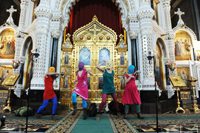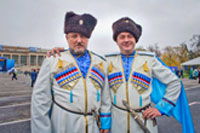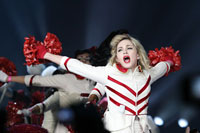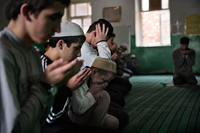Twelve cultural events of 2012 in Russia

2012 was the year of Pussy Riot. Source: RIA Novosti
1. 2012 was the year of Pussy Riot. On 21 February the punk group organised a performance in the Cathedral of Christ the Saviour in Moscow, and an internet clip quickly followed. Three of the group were arrested on 3 and 16 March – following which the clip went viral, soaring from just a few thousand views into millions. On 17 August the performers were sentenced to two years in a prison camp for hooliganism, although one was subsequently released without charge. On 29 November a Court judged the clip to be of “extremist”. The international art and rock-music community swiftly came out in support of the singers, although the Russian community mainly obsessed on whether the event had been blasphemous.
2. The art exhibition Icons in Krasnodar was shut down by Cossacks. The exhibition was assembled by Marat Gelman, an influential gallery-owner and contemporary art curator, who took the exhibition to Krasnodar – a city in southern Russia near the Black Sea. The exhibition presented a new view on religious artefacts by contemporary artists. The exhibition prompted fury in the region and priests came out against it – the region's prominent Cossack grouping formed picket lines outside the entrance to the venue, with fights ensuing. The exhibition failed to open, and Gelman claimed that he'd been beaten up.
3. An extensive retrospective of Russian contemporary art opened on 14 June in Barcelona, displaying the work of Kandinsky Prize winners over several years. “When we examine the works which were submitted for display, we conclude that artists who are involved in theoretical explanations of their own output are creating a kind of ‘alternative program’ – they are heavily ideological. Their idea of art is not so much related to life, or people's mentality and the ways they communicate, but rather with an ideological agenda that's developing in the political arena” said the exhibition's curator, Andrei Yerofeyev.
4. The new film “The Horde” premiered on 23 June at the Moscow International Film Festival. The plot is the painful story of medieval Russian Archbishop Alexey's and his journey to the Mongolian Khan, the ruler of both Tatars and Russians. The Archbishop was charged with curing the Khan's mother eye-disease. The terrifying film that resulted won the Best Director award at the Moscow Film Festival, along with numerous other awards. Although the film went down well with priests, it enraged historians, and foundered at the box office.
5. Hugh Laurie appeared in both Moscow and St Petersburg on 25 June with his “blues” show. Tickets sold out in just a few days, and it turned out to be one of the most popular, and apparently best concerts of the year. Laurie downed a shot-glass of vodka on-stage, went down on one knee before the audience, chatted in Russian to the crowd, and played some rather nervous mainstream blues. Tickets cost an arm and a leg, but were still worth it.
6. On 9 August 2012 Madonna performed a major gig in St Petersburg. During the show she gave her support to Russia's gay community – the city had just passed a law prohibiting the promotion of homosexuality among minors – and to the arrested members of Pussy Riot. A number of protest groups took Madonna to court, intending to bring her to justice for the promotion of homosexuality among minors – they claimed there had been children in the audience. They attempted to secure damages for moral outrage totalling some 333 million roubles (about $11 million). On 22 November a St Petersburg court threw the case out, citing an “adults only” warning on the concert tickets – the event was clearly not for minors. As usual, the show itself went off in spectacular style.
7. On 1 September a new law came into force, protecting children from harmful information, imposing age-category ratings of 0+, 6+, 12+, 16+ and 18+ on all cultural material: books, films, computer games, websites, and publications. First to be hit by the law were classic soviet-era films and cartoons – which feature a number of antisocial characters who drink, smoke, and are prone to aggression. Even so, it remains the first working attempt since the Soviet era to impose mandatory ratings, and it's gaining pace on the fly.
8. The film “Innocence of Muslims” by Nakoula Basseley Nakoula – a degrading account of the life of the Prophet Mohamed – was declared to be “extremist” by the Tverskaya district court in Moscow, after extensive campaigning and the General Procurator's office report. The ruling made the film's distribution in Russia illegal. The event prompted furious internet discussion about the legitimacy of Russia's laws on extremism.
9. The Red Square Screenings were held from 15 to 20 October in Moscow, in which the Russian Film Foundation invited foreign movie distributors to Moscow to see new Russian films and “Work In Progress” – projects in different stages of production. It marked the first systemic attempt to promote Russian film-making abroad, in both arthouse and mainstream genres. The screenings were held in the movie-hall of GUM – Moscow's venerable shopping mall, opposite the Kremlin. The event promoters believe the showing was worthwhile, and that American and European movie-distributors took an interest in Russian films. The event is scheduled to be repeated annually.
10. On 20 October the Chapman Brothers had an exhibition in St Petersburg's Hermitage Gallery. The British artists’ show, titled “The End Of Fun” was shown in Russia's foremost art gallery – a modification of their show “Hell”, which features a number of aquariums and ranks of toy soldiers on guard, torturing and executing each other. By Autumn Cossack detachments had already mobilised in most Russian cities to protest about any kind of contemporary art – and particularly about the clown on the crucifix who forms one of the show's exhibits. The Hermitage checked in advance with city prosecutors against allegations of extremism, and came out clean. Jake and Dinos Chapman said they were “extremely sorry” to Russians in any case, and promised never to bother bringing their work to Russia again.
11. The Russian TV series “The Dark Side of the Moon”, based on the British “Life on Mars”, which also had a USA version – was shown on Channel 1 television in November 2012. It emerged as the best of many adaptations of Western TV series. Policeman Mikhail Soloviev reverts to the year 1979 after an accident, and finds himself inside his father's body – also a policeman. Where British and American cops may have writhed against the policing norms of the past – interrogations and bent evidence – the Russian series came out rather differently, with the police captain struggling against a world of socialist legal systems.
12. On 28th November the book “Everyday Saints”, by Father Tikhon (Shevkunov), was awarded the “Top Book” prize by a Reader's Choice jury. The book had won the “Prose Book of the Year” award earlier, from the Federal Press Agency. The short stories about the lives of monks in the Pskov Catacomb Monastery during the Soviet era prompted intense public interest. By end-2012 the edition had already gone beyond the one-million mark.
All rights reserved by Rossiyskaya Gazeta.
Subscribe
to our newsletter!
Get the week's best stories straight to your inbox



